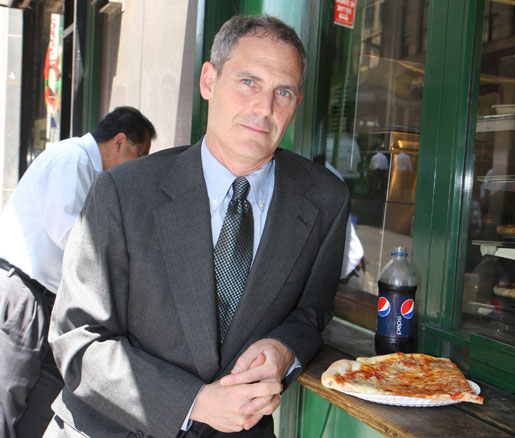
Visit Fred Kaufman’s website and you’ll find one sentence in the top-right corner: “the food journalist who went looking for a slice of pizza and ended up on Wall Street.” Dig deep into his reporting and you’ll find that Kaufman has exposed unsettling ties between the worlds of food and finance, which he also details in his latest book, Bet the Farm. Before he joins us as one of our moderators at the JBF Food Conference, read on to get a preview of his conference discussion and the revelations in his book.
--
JBF: Next week you're speaking at our conference, the theme of which is trust. We hear you're discussing organic free-range chickens. Can you give us a preview of what you'll be covering? Why organic free-range chickens, and how does this relate to the topic of trust?
FK: Nothing we consume—with the possible exception of water—can be found in nature. For the past 10,000 years or so, people have been transforming the food we eat, from apples to wheat. Man created the cow, the pig, and the organic free-range chicken. But where do we draw the line between legitimate domestication and Frankenfood? What kinds of alterations do we trust? That’s our topic.
JBF: You have a book coming out this week. Can you tell us what it's about?
FK: The book is called Bet the Farm: How Food Stopped Being Food, and it’s about the history, economics, and politics of the global food crisis. I followed the money from the corporate headquarters of Domino’s Pizza and of Tyson Foods to genetic modification laboratories across the United States, to United Nations meetings in Rome, and ended up one block from where I live—on Wall Street. Everywhere I went I discovered that food has become something it is not: an item on a spreadsheet, a legal construct, a political football, a financial derivative. Everywhere I went, food looked less and less like food and more and more like money. Ultimately, I came to the realization that the system had been financialized, that Wall Street had twisted global food into yet another profit machine.
JBF: What were some of the most surprising things you encountered while doing your research for the book?
FK: I was surprised that some of the world’s largest financial institutions, from Goldman Sachs to Deutsche Bank, Barclays, and JP Morgan Chase, have come to realize tremendous financial value in fresh water, arable land, and food. And I was shocked to learn the lengths they would go to profit from scarcity and hunger.
JBF: We read that you found some pretty startling information about the effect that the push for sustainability has on the food system. Can you elaborate on that?
FK: I thought that sustainability would be a key to making inexpensive, delicious, and nutritious food available to everyone on earth. Unfortunately, I discovered that sustainability has been transformed from a scientific idea into a marketing term. Unsurprisingly, Walmart has taken the lead in these efforts.
JBF: We also heard that you assert that the rise of fast food is bad for us, but disastrous for those who will never even see a McNugget or frozen pizza. Why is this?
FK: I spent a lot of time investigating global pizza, from the wheat to the cheese, the tomatoes to the pepperoni. Every step of the way, mass-produced, subsidized and commoditized food has had the effect of increasing profit margins for purveyors of fast food, while crushing small farmers worldwide. Of course, half the world is fed by the planet’s two billion small farmers!
JBF: Once you're finished promoting your book, what's next for you? Are there any other food subjects that you're going to investigate?
FK: I’ve been thinking a great deal about the financialization of the world’s water supply, and will be heading to Africa next month to investigate.
Join us when Fred Kaufman discusses Bet the Farm at an installment of Enlightened Eaters at the James Beard House on November 7. Kaufman will also participate in a Food Day Twitter chat on October 24 at 3:00 P.M. EST, which you can follow by using the #FoodDayChat hashtag.



-57 web.jpg)


